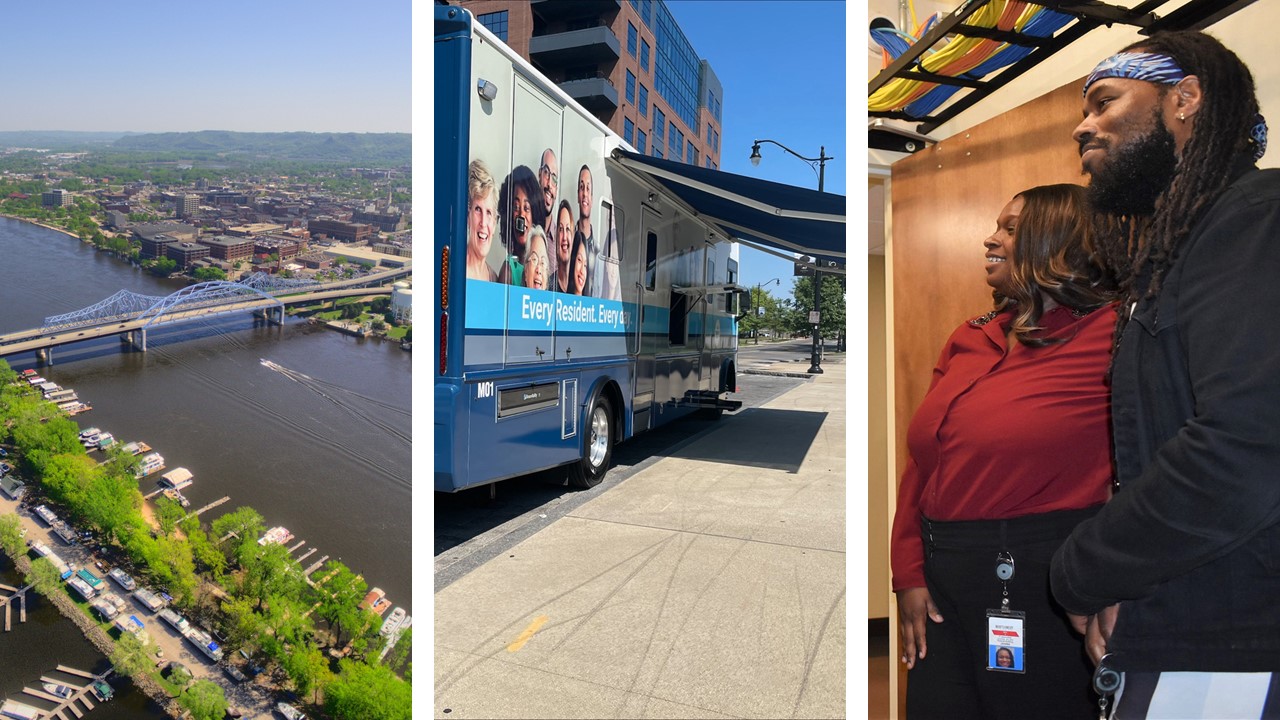
Creating New Models of Care
A dynamic community services center that fosters interactions between young children and older adults, with housing for those in need
BY JANE KLEKAMP
When I assumed the role of administrator for La Crosse County, Wisconsin, USA, we faced a significant challenge: we owned a nursing home that, while highly regarded for the quality of care it provided, was housed in an aging, institutional-style building, half of which sat empty.
This left us at a crossroads. The long-term care model had evolved beyond what our facility could offer. Many of our peer counties had chosen to exit the nursing home business entirely, given its complexities. However, we knew that was not the right path for La Crosse County.
We recognized that the need for long-term care in our community was only growing and presenting new challenges. Supporting caregivers—both paid professionals and family members—had to be a priority. At the same time, we sought opportunities to create new forms of supportive housing that traditional nursing homes did not provide.
Two years later, that aging nursing home is being transformed through a $20 million renovation into a dynamic community services center. The project is nearing completion, with a grand opening scheduled for early 2026. Our hope is that this initiative will serve as a model for other counties looking to reimagine their public services.
At the heart of the project will be an intergenerational center. This will mean a daycare for about 60 kids, in a shared space with an adult day center for older adults, many with mild to moderate dementia. County employees will receive priority access to the daycare slots.
Most of our care work is performed by women, many of whom finish their paid shifts only to begin unpaid caregiving responsibilities at home, whether for children or aging family members. The intergenerational center will offer a new way to support caregivers of older adults alongside a traditional daycare. We believe that fostering interactions between young children and older adults will enrich both groups.
Meanwhile, another part of our renovated building will feature a dementia crisis stabilization unit. This unit will provide specialized, short-term stays for individuals experiencing dementia-related crises, helping to stabilize their condition while long-term care solutions are developed. This is a need we expect to grow as our population ages.
The existing residents of our nursing home will receive renovated rooms as part of our project, and another wing will be redeveloped into a community-based residential facility. Finally, another wing of the old nursing home building is being renovated into 10 units of supportive housing for people experiencing homelessness. We see this as fitting perfectly into the nursing home’s original mission of providing shelter for those in need.
Bringing all these services under one roof has required extensive collaboration but the most important ingredient has been a willingness to experiment. By reimagining our nursing home, our county has demonstrated what’s possible when local governments take bold steps to meet community needs. It’s a model we hope we can apply to other projects, and one I hope other counties will seek to replicate.

JANE KLEKAMP is county administrator of La Crosse County, Wisconsin, USA.
Enhancing Community Well-Being Through Accessibility
Franklin County’s commitment to meeting residents where they are
BY KENNETH N. WILSON
The fundamental responsibility of any government is to create conditions that enable residents to thrive. In an ideal world, success would be determined by individual effort and the strength of one’s ideas and character. However, we know that opportunity is not equally distributed. Many of our neighbors face financial hardship for reasons beyond their control, limiting their access to the resources necessary to prosper.
Recognizing this challenge, the Franklin County Board of Commissioners in Central Ohio has prioritized creating equitable opportunities for residents to flourish in four key areas: personal growth, professional growth, financial stability, and overall health and well-being. They are dedicated to serving, supporting, and uplifting all residents through a government rooted in respect, equity, and human-centered care.
Guided by their core principles—community safety and security, job creation and economic development, health and human services, environmental sustainability, fiscally responsible government operations, and racial equity—the commissioners and county administration work to ensure that every resident’s fundamental social, economic, wellness, and environmental needs are met.
A Community Driven to Reduce Poverty
With a steadfast commitment to innovation, sustainability, and fiscal responsibility, Franklin County strives to build a stronger, more inclusive, and thriving community where everyone can prosper. That’s why we developed Rise Together: A Blueprint for Reducing Poverty in Franklin County through the leadership of the county commissioners, business advisors, and community stakeholders. This initiative addresses poverty and systemic inequities that hinder residents and their children from accessing opportunities. At its core, Rise Together is a collaborative effort inviting residents to help shape solutions to foster their productive, prosperous, and thriving future.
From these numerous discussions, two key initiatives—Mobile Units and One Door—were born. Both are designed to enhance accessibility and streamline services for those who need them most. Franklin County residents repeatedly emphasized the need for more accessible support systems, and these initiatives directly respond to those calls to action.
Mobile Units: Bringing Essential Services to the Community
The Franklin County Commissioners’ Mobile Units represent a shift toward innovative service delivery models that meet the needs of a diverse population, including those in underserved municipalities, villages, and human service deserts. These units embody a human-centered approach to bringing essential services directly to residents, eliminating systemic barriers and promoting a welcoming, private environment for productive community engagement, all to find a path forward for every individual’s unique needs.
Through the mobile units, residents can access a full array of services from Franklin County Health and Human Services agencies, anything from basic needs like food, housing, and health coverage to job training, legal assistance, childcare, aging resources, and so much more.
By being mobile, these units can quickly adapt to changing community needs and emergencies, providing timely assistance where needed, unconstrained by the limitations of a fixed location. They also play a critical role in addressing social determinants of health and bridging accessibility gaps identified and voiced in the Poverty Blueprint, known as the People’s Plan. Learn more at jfs.franklincountyohio.gov/mobile-unit.
One Door: A Seamless, Dignified Approach to Human Services
One Door is a transformative initiative designed to simplify access to essential health and human services for Franklin County’s 1.4 million residents. By consolidating services from five key agencies—the Office on Aging, Child Support Enforcement Agency, Job and Family Services, Justice Policy and Programs, and Veterans Services—into a single, integrated system, One Door ensures that residents receive coordinated support with efficiency, dignity, and kindness.
“One Door isn’t just about providing services; it’s a philosophy rooted in equity and designed to empower every resident,” said board president commissioner Erica C. Crawley. “This initiative is a game changer, meeting residents where they are with dignity, compassion, and opportunities to thrive.”
Navigating multiple agencies to access critical services can be time-consuming and frustrating for anyone. One Door streamlines this process by prioritizing individuals’ needs under one roof. A shared electronic needs assessment and triage tool facilitates seamless management between agencies, ensuring faster, more comprehensive support for individuals and families, with less duplicative paperwork, appointments, and frankly, less running around to each agency site.
“This initiative reflects Franklin County’s dedication to serving residents in transformational ways,” said commissioner Kevin L. Boyce. “The One Door approach creates a healthier, more resilient community by ensuring critical services are accessible, efficient, and impactful.”
A Commitment to Innovation and Measurable Impact
With 43% of residents requiring resources from multiple agencies, these initiatives are about more than just improving accessibility. They offer hope by boosting economic mobility and enhancing inter-agency communication and are grounded in positive, measurable outcomes. By aligning public policies with unified messaging, residents spoke, and the commissioners listened by strengthening their commitment to innovation and community welfare.
“While many in our community continue to face challenges, One Door and the Mobile Units are about breaking down barriers and building a system that works for everyone,” said commissioner John O’Grady. “These initiatives are a direct investment in helping families and creating pathways to success.”
Through these forward-thinking initiatives, Franklin County is setting a new standard for public service that prioritizes accessibility, equity, and the well-being of every resident—after all, that’s the job of county government.

KENNETH N. WILSON has served as administrator of Franklin County, Ohio, since 2015, overseeing 15 agencies, 1,400+ employees, and a $2 billion budget. He currently serves as president of the National Association of County Administrators and vice chair of the National Association of Counties.
IT Apprenticeship with the Board of County Commissioners
A unique opportunity that provides training and career development for residents while they work for the county.
BY KEVIN LAVOIE
While some mothers-in-law can be intrusively opinionated, others will caringly offer sage advice that can change your life. Just ask Janisa Allen and Draelind Cannon. Both learned about the IT apprenticeship program for Montgomery County, Ohio, USA, from their mothers-in-law, and now they are the very first apprentices working in the Board of County Commissioners (BCC) IT Department.
Both Allen and Cannon started in the very first cohort of the IT Fundamentals course offered at the Employment Opportunity Center (EOC) at Westown Shopping Center on Third Street in west Dayton. A partnership between Sinclair College and Montgomery County, the process starts with an aptitude test that helps determine if IT is right for the candidate. A three-credit-hour IT Fundamentals course then follows at the Westown EOC.
Qualified individuals can get funding for the program through the Workforce Innovation and Opportunity Act and other grants. After the initial class at the EOC, students can advance to more Sinclair College courses either online or on campus.
“We knew we wanted to create a unique opportunity for Westown that would meet a community training need and set residents up for well-paying careers,” said county commission president Judy Dodge. “There weren’t a lot of opportunities for IT training in west Dayton. We have now completed nine cohorts of this introductory class. Businesses in our area need to hire IT professionals, so it’s a win-win for everyone.”
Promising students can advance to a paid apprenticeship after just a few months and can work while they complete their associate degree. Allen is working full-time on the IT Service Desk. Cannon is leaving a second job so he too can work full-time with BCC IT while he completes the 61 credits needed for his associate degree from Sinclair.
“We wanted to make an impact in the community that would remove some barriers to help residents obtain and sustain gainful employment,” said assistant county administrator Chris Williams.
“We had hoped this program would help us fill some IT vacancies within our department,” said Jim Brandenburg, director of BCC IT. “We’ve had 33 students pass the IT Fundamentals course at Westown, and eight of them are currently enrolled at Sinclair College to continue their IT education. Even if they don’t wind up working with us, this is a great county success story because if fills a big need for our community.”
After earning an IT Fundamentals certificate through the Westown program, students choose one of five fields of specialization. They can go into paths for network engineering, cyber security, software development, user support, or system administration.
“I am their point of contact at Sinclair,” said Dawn Warner, apprenticeship program manager. “I make sure they know which courses they need to register for, help them register if needed, make sure their funding is in line, walk them though how to get their textbooks, and answer any questions they have about their classrooms or professors.”
While Sinclair College has nine apprenticeship programs approved with the state of Ohio, most of them are in manufacturing or the building environment (HVAC/construction). “They [Janisa and Draelind] are pioneering a brand-new model of training,” Warner said. “They are the first IT apprenticeship students in the area that I’m aware of.”
The county customizes the work experience for each apprentice to ensure that it is relevant to what they are learning through Sinclair College. To find out more about Montgomery County’s workforce opportunities, go to thejobcenter.org.

KEVIN LAVOIE is director of communications for Montgomery County, Ohio.
New, Reduced Membership Dues
A new, reduced dues rate is available for CAOs/ACAOs, along with additional discounts for those in smaller communities, has been implemented. Learn more and be sure to join or renew today!
